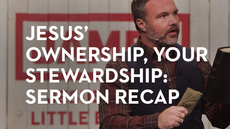Come now, you rich, weep and howl for the miseries that are coming upon you. 2 Your riches have rotted and your garments are moth-eaten. 3 Your gold and silver have corroded, and their corrosion will be evidence against you and will eat your flesh like fire. You have laid up treasure in the last days. 4 Behold, the wages of the laborers who mowed your fields, which you kept back by fraud, are crying out against you, and the cries of the harvesters have reached the ears of the Lord of hosts. 5 You have lived on the earth in luxury and in self-indulgence. You have fattened your hearts in a day of slaughter. 6 You have condemned and murdered the righteous person. He does not resist you.
Introduction
Several years ago, the world was outraged over the case against Bernie Madoff, a former stockbroker and investment advisor responsible for the largest, longest, and most widespread Ponzi scheme in history. Madoff’s fraud totaled in the billions. At his sentencing hearing, the judge in the case condemned Madoff’s crimes as “extraordinarily evil” and imposed a sentence over ten times longer than the defense lawyers had requested—one hundred and fifty years. In addition to the victims who testified against Madoff, his self-indulgent, luxurious lifestyle also testified against him: tens of millions of dollars spent in acquiring personal properties; $45 million in bonds; $17 million in cash; $8.8 million for yachts; $2.6 million in jewelry, and a whole lot more. It was an outrageous hoard gained through unthinkable fraud, and Madoff heaped the riches upon himself.
Beginning in chapter 5, James wastes no time making his point clear. “Listen, you rich, weep and howl for the miseries coming upon you.” His accusations are seething. When reading this passage, one cannot help but see a courtroom setting with the Lord of hosts seated high upon his throne, hearing the testimony of victims and carefully reviewing the irrefutable evidence (v. 4). The accused were rich landowners who were exploiting the poor by withholding wages and, like Madoff, were using the money to live in luxury and self-indulgence. James is in no way condemning all who were rich; after all, James was a devout Jew who knew God had financially blessed many believers, most notably Abraham, Job, David, Philemon, Joseph of Arimathea, and Lydia. Instead, James was condemning the way the rich accumulated their wealth and how they used it. James likened the rich to animals who were being fattened for slaughter.
Observation
- In the original Greek, the verbs “weep” and “howl” are words that imitate the sound they’re describing. (Think of the “chug, chug” of a train, or the “ding-dong” of a clock.) In James 5:1, James is calling the rich landowners to dramatic responses of desperation and lament. What does James say should cause the rich to weep and howl?
- Read James 5:2–4. What evidence is presented in the case against the rich? What condition does James say their riches are in?
- Read James 5:5–6. Who is testifying against the rich? What evidence is presented against them? What five charges are they facing?
- “Lord of hosts” is a title emphasizing God’s all-encompassing reign over every physical and spiritual power in creation, and it occurs more than 240 times in the Hebrew Scriptures. Why do you think James calls God by this title (v. 4)? How does this speak to the rich? How should this comfort the laborers?
Interpretation
- James’ warning to the rich is reminiscent of Jesus’ warning in the Sermon on the Mount. Read Matthew 6:19–20. What does the withholding of wages and hoarding of possessions reveal about the hearts of the rich? Read Matthew 19:16–22. How does the rich man’s response to Jesus’ request reveal what he treasures most?
- To “condemn” (v. 6) reflects the legal context of a court, where judgment or condemnation is handed down. How is this verse ironic?
- Read Matthew 5:4. What is God’s response to those who mourn over their sin? Read Zephaniah 1:18 and Revelation 3:16–19. What miseries await those who do not mourn?
- The book of James begins with a mysterious paradox, calling believers to find joy in the midst of trials (1:2–5). Although James is speaking to the rich, how might this passage also give hope to the suffering and encourage patience? What does James instruct them to do?
Application
- Name a few things you find satisfaction in that only belong to this world. What evidence of stored up treasures show your excess? How might you instead find satisfaction in your relationship with the Father through Jesus?
- Wealth is a relative term. All of us find ourselves richer than someone else, even while we may feel poorer than many others. What wealth has God blessed you with? In what ways can you better steward his money for his glory and the good of others?
- What personal debts are crying out to the Lord of hosts? How will you mourn over your sin now and turn to God in repentance?
- Godly sorrow for personal sin is evidenced by the removal of those sins from our lives; if we cling to our sin, the sorrow was not genuine. How is mourning over your sin evidence of God’s grace? In what ways do you need to respond to him in light of that grace?
- James alludes three times to eternity (5:1, 3, 5b), imploring the rich to consider the coming reconciliation to the Creator. How does remembering eternity help you practice patience in trouble and seek God for wisdom? How does it help you live generously?
For Further Study
- James: Faith that Works by R. Kent Hughes
- Be Mature by Warren W. Wiersbe
- The Sermon on the Mount: The Message of the Kingdom by R. Kent Hughes
- The Names of God by Ann Spangler
This devotion is adapted from the James Study Guide. Pick up a copy today for only $9.99. The Study Guide includes a 15-week curriculum, a small group study, a group inductive study, as well as 75 daily devotions for your personal or family worship.













